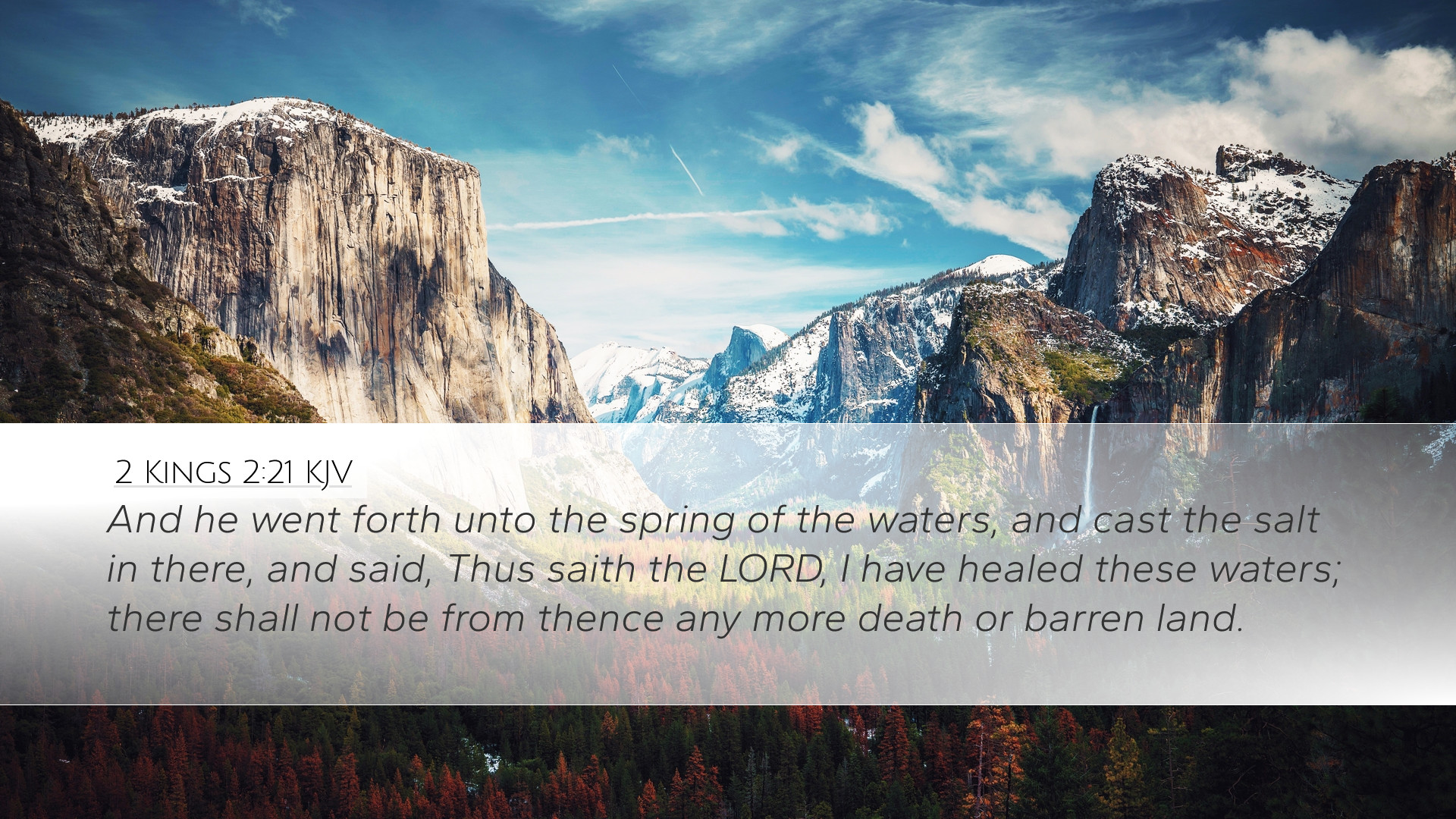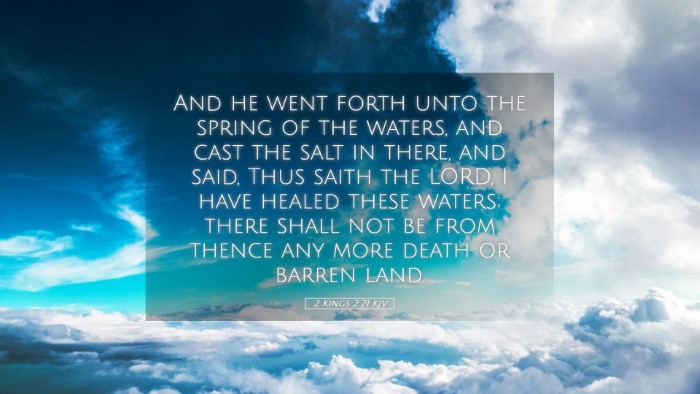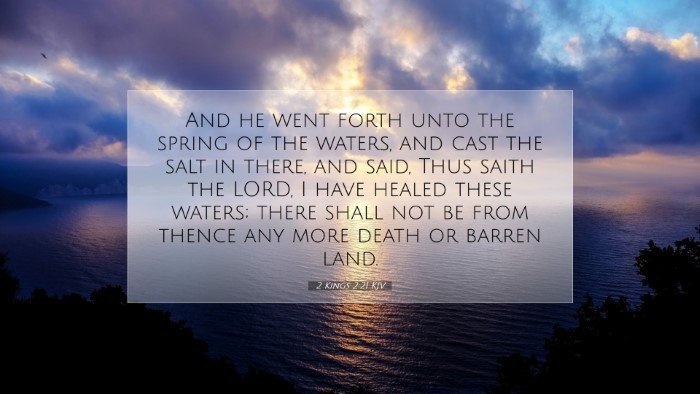Commentary on 2 Kings 2:21
Text of the Verse: "And he went forth unto the spring of the waters, and cast the salt in there, and said, Thus saith the Lord, I have healed these waters; there shall not be from thence any more death or barren land."
This verse describes a significant moment in the prophetic ministry of Elisha following that of Elijah. Elisha's actions symbolize not only the physical healing of waters but also the spiritual renewal and divine intervention in the lives of the people of Jericho.
Contextual Overview
In the larger narrative of 2 Kings, we witness God's continuous faithfulness to His people amidst their failures. The backdrop of Elisha's ministry reveals a time of moral and spiritual decay in Israel. Jericho, known for its previous history (especially its fall in Joshua 6), had become symbolic of judgment due to its corrupt practices. The problem of the waters being “bitter” or “bad” likely reflects physical reality and serves as an allegory for the moral state of the surrounding society.
The Symbolism of the Waters
Healing the Waters: When Elisha casts salt into the waters, it symbolizes purification and restoration. Salt, often associated with preservation and flavor (as seen in Matthew 5:13), here represents a cleansing agent, capable of revitalizing what had gone wrong. This act signifies that God can restore not only physical aspects of creation but also the spiritual well-being of His people.
Death and Barrenness: The promise that "there shall not be from thence any more death or barren land" implies a reversal of the curse that hung over the land due to unfaithfulness. The connection between physical health of the land and spiritual fidelity is a recurring theme in the Scriptures. As Elisha intercedes, he brings hope that the community can experience new life.
The Role of Elisha
Prophetic Authority: Elisha's actions illustrate the authority bestowed upon him as the Prophet of the Lord. His ministry is marked by miracles that demonstrate both God's power and His compassionate response to human need. Elisha stands in the legacy of Elijah, yet he carves out his own path by actively engaging with the concerns of the people.
Faith in Action: Elisha’s healing of the waters exemplifies the necessity of faith manifesting in action. He does not merely pray for the waters but directly engages with the substance, thus illustrating that faith must be coupled with deeds. This challenges the faith community to consider how they might act in faith when confronted with the struggles of their environment.
Theological Implications
Divine Intervention: The verse paints a vivid picture of God’s ability to intervene in the direst of circumstances. The healing of the waters at Jericho serves as a testament to God’s omnipotence and His willingness to restore what is broken. From a theological standpoint, this encourages believers that no situation is too far gone for God’s redemptive work.
Spiritual Barrenness: The overarching theme extends beyond the geographical location to touch upon spiritual barrenness, a condition prevalent wherever sin abounds. The restoration of Jericho’s waters stands as an invitation for hearts and communities to seek renewal and healing from the Lord.
Applications for Today's Believer
-
The Call to Restoration: Believers are called to be agents of change in their communities, addressing the issues that contribute to spiritual and moral decay. Like Elisha, this may involve proactive measures and a commitment to prayer and action.
-
Faith in Action: This passage encourages individuals to place their faith in God's power to transform lives, urging them not to merely hope for change but to actively pursue it, trusting in the divine will for restoration.
-
Perseverance in Ministry: For pastors and church leaders, the story of Elisha is a reminder that the path of ministry involves challenges from entrenched sin and resistance. It calls for unwavering commitment to God’s call amidst societal trials.
-
Community Engagement: The healing of the waters illustrates the importance of engaging with the pressing needs of one’s environment. Churches and individual believers are challenged to address social, moral, and physical issues within their locality with practical solutions rooted in faith.
-
Hope for the Hopeless: The narrative presents a message of hope, indicating that God can bring life where there is despair. This ought to be a core message of the Gospel, providing assurance to those feeling defeated or barren.
-
Prayer and Action: The act of casting salt may serve as a metaphor for the believer's integral role in prayer, followed by action. How we intercede on behalf of others should propel us into the public square where we seek holistic well-being for those around us.
-
Divine Authority: Understanding the authority Elisha commands underlines the importance of recognizing our own identity in Christ. We have been endowed with authority to act as salt and light in the world, bringing healing and hope to a broken creation.
-
Spiritual Renewal: Ultimately, this verse invites reflection on personal and communal spiritual health, urging believers to evaluate areas where barrenness may exist and to actively seek God’s renewing presence.
Conclusion
2 Kings 2:21 stands as a powerful testimony of God's restorative nature, exemplified through the actions of Elisha. As modern-day believers look back on this account, they are encouraged to embrace their role as agents of healing, bringing God’s redemptive presence to the challenges faced in their communities. The healing of Jericho's waters reminds us that God's grace extends to every area of life, urging us toward faith-filled actions that lead to transformation, renewal, and hope.


